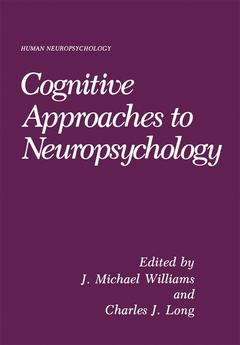Cognitive Approaches to Neuropsychology, Softcover reprint of the original 1st ed. 1988 Human Neurosychologie Series
Langue : Anglais
Coordonnateur : Williams J. Mark

Since its early development, neuropsychology has examined the manner in which cognitive abilities are mediated by the brain. fudeed, all of neuropsy chology, and especially clinical neuropsychology, could be subsumed under this general investigation. However, a variety of factors impeded the close as sociation of neuropsychologists and cognitive/experimental psychologists. These factors were prominent influences in both camps, which kept the study of cognition away from a consideration of biological foundations and kept neuropsychology theoretically impoverished. In recent years, these factors have diminished and "cognitive neuropsychology" has become a popular term to describe the new movements to join the study of cognition with the study of brain function. The factors which kept these areas separate were manifestations of his torical trends and represent a social distance which largely happened by acci dent. The first and perhaps most important factor was that early investigators of cognition and brain function were not psychologists. Most were neurolo gists or otlier neuroscientists who were excellent observers of behavior fol lowing brain injury but had virtually no theoretical context of cognitive psy chology, which would allow them to expand and deepen their understanding of the behavior they were observing. As more psychologists who have such a context have observed the consequences of brain disorders, especially aphasia and amnesia, the study of them has become far more comprehensive as theo ries of language and memory derived from cognitive psychology have been incorporated into the investigations.
1. Four Computational Models for Investigating Neuropsychological Decision-making.- 2. Acalculia: Multiplication Fact Retrieval in Normal and Impaired Subjects.- 3. Attentional Imbalances following Head Injury.- 4. Toward a Cognitive Neuropsychology of Complex Learning.- 5. Aging and Spatial Cognition: Current Status and New Directions for Experimental Researchers and Cognitive Neuropsychologists.- 6. An Integrated Approach to the Neuropsychological Assessment of Cognitive Function.- 7. Everyday Cognition and the Ecological Validity of Intellectual and Neuropsychological Tests.- 8. Psychometric Confirmation of Neuropsychological Theory.- 9. The Role of Motivation in Rehabilitation.- 10. Brain Imaging: Positron Emission Tomography and Cognitive Functioning.- 11. Child Neuropsychology and Cognitive Developmental Theory.- 12. Neuropsychological Aspects of Simultaneous and Successive Cognitive Processes.- 13. Familial Sinistrality and Syntactic Processing.- 14. Adult Cognition: Neuropsychological Evidence and Developmental Models.- 15. Preserved Cognitive Functions in Dementia.- 16. A Preliminary Neuro-cognitive Model of Tactuospatial Motor Learning.- 17. The Neuropsychology of Autobiographical Memory.
Date de parution : 04-2012
Ouvrage de 361 p.
17.8x25.4 cm
Disponible chez l'éditeur (délai d'approvisionnement : 15 jours).
Prix indicatif 52,74 €
Ajouter au panierThèmes de Cognitive Approaches to Neuropsychology :
Mots-clés :
behavior; brain; brain injury; clinical neuropsychology; cognition; cognitive psychology; memory; neuropsychology; psychology
© 2024 LAVOISIER S.A.S.



